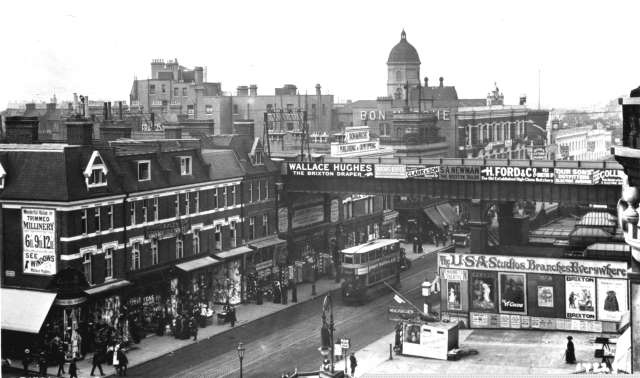PC to Miss Crawshaw etc franked 16 De 14
Card dated 16-12-14Dear Till
Just a few lines hoping this finds you all at home in the best of health as I am the same. Well Till we will soon be having Xmas here now, where are you going to this year Dollies? I hope you all have a good time at home only Tom and I won’t be there like last year, no drop of Lizzie. We are still on the go and there is plenty of mud out here I can assure you.
How are you getting on at Stewarts still blacking your nose? Have just heard from Jess she is getting on alright. How does Mattie get on for cold tea now it has gone up? I expect you all had a good time when Tom was home. Till I thought I was at Brixton when I was marching the other day for what should pass us was one of the Bon Marché motor lorries I gave the Bhoys a shout and said that Brixton was the Flower Garden of England and you should have heard the Bars (?) I got. Now I think this is all the news this time hoping to hear from you soon
Bid xxx
16th October 1914
It’s just as well Mabel got a letter from Frank as not much happened today and the Dorsets remained in billets for the day.
It can’t have been fun for Frank to contemplate spending Christmas in muddy Belgium. This flurry of letters home might reflect that fact that his attention is not wholly with fighting the Germans. It appears that Tom spent Christmas with Frank and the Family in Brixton the previous year. The more I read about Tom the more I am convinced that he is a cousin of Frank’s. The only problem is that the age of Caroline and Matthew Webster is a little bit young to have a 19-20 year old son. Caroline is 36 in 1914. Did Walter or Caroline have a child with an earlier partner? I cannot find anything that suggest this. Or is Tom another cousin from the Crawshaw side? This remains a mystery and it’s driving me nuts!
Frank uses the same phrase “blacking your nose” to describe Mabel’s duties at Stewarts. I imagine she is a waitress there. Anyone who has worked in a small catering business has to be a multi-tasker. My mother remembers Mabel being an excellent cook. Perhaps she learned from her father, “Stammering Sam”. She always had a stockpot ticking away on the stove. I still haven’t found any sources for this phrase.

Frank cheers as a Bon Marché lorry goes by. I’m not sure if the answer “bars” was an answer at all. The Bon Marché was a big department store in Brixton. In fact, it was the first purpose-built department store in the UK. It was started from the winning on a horse race and ended up as part of the John Lewis empire.
Quite what one of their lorries was doing out at the front is anyone’s guess. It could have been one of the London buses (with adverts still on the sides) that had recently been commandeered for the front. It could have even been a local delivery truck for another Bon Marché business. A Paris-based department store had a fleet of lorries for deliveries.
The Flower Garden of London may be a surprising monicker for the Brixton of today but road names like Lavender Hill in Clapham tells the story of South London’s past. Much of the area was farmland in the Eighteenth Century, giving way to the tide of housing that followed the railways as thy snaked their way to the suburbs. Apparently strawberries were Brixton’s speciality but I cannot find any primary sources confirming this. A lot of sloppy copying and pasting in tourist guides is propagating this rumour. You won’t find that kind of behaviour here. I change some of the the words around before posting.